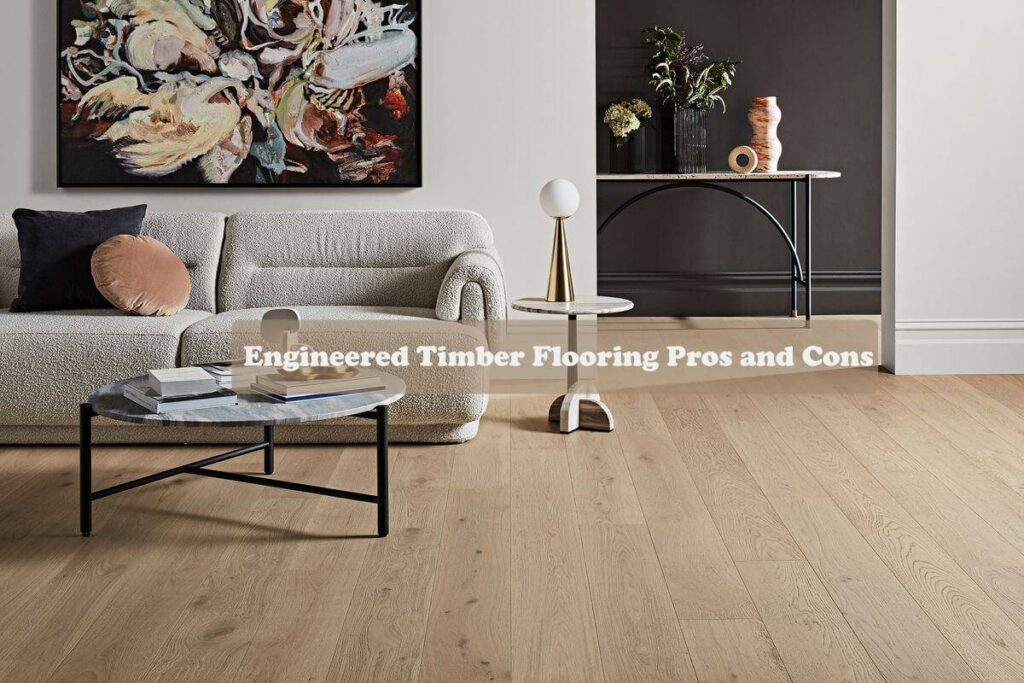Considering Engineered Timber Flooring? Engineered timber flooring can elevate the aesthetics of any space, offering a timeless and eco-friendly touch. However, it’s not a one-size-fits-all solution.
Explore Dex Flooring‘s selection of stunning engineered timber floors. Find the perfect match for your style and browse our expert installation options. Visit us today or call for a free consultation!
Let’s explore the engineered timber flooring pros and cons to help you decide if it’s the right choice for your home.
Engineered Timber Flooring: A Compelling Choice for Your Home
Engineered timber flooring offers a wealth of advantages, making it a strong contender for your next flooring project. Here’s a breakdown of its key benefits:
- Uniquely Beautiful: Each engineered timber board boasts natural variations, ensuring your floor is one-of-a-kind.
- Luxury and Elegance: Achieve the same sophisticated look of solid hardwood with the added benefit of superior stability.
- Solid Wood Beauty, Lower Cost: Enjoy the stunning aesthetics of solid hardwood at a more affordable price, especially considering installation costs.
- Eco-Friendly: Engineered timber utilizes resource-intensive hardwood only for the top layer, minimizing environmental impact. Additionally, it utilizes fast-growing, farmed trees and maximizes wood usage.
- Pre-finished and Low VOCs: No need for on-site finishing that releases harmful VOCs. Engineered boards come ready to install, promoting better indoor air quality.
- Reduced Waste: Engineered timber makes efficient use of the entire tree, minimizing production waste.
- Design Versatility: Engineered timber offers the same design options as solid hardwood, allowing you to perfectly match existing flooring.
- Fast and Easy Installation: Unlike solid hardwood, engineered timber can be installed quickly and easily, often within hours, without specialized skills.
- Simple Repairs: Damaged boards are readily replaced, eliminating the need for extensive floor repairs or refinishing.
- Highly Stable: Engineered timber overcomes the stability issues of solid hardwood, making it perfect for any climate.
- Boosts Property Value: High-quality, natural wood flooring adds lasting value to your home, appealing to potential buyers.
- Moisture Resistant: Engineered timber won’t swell or warp like solid hardwood, making it ideal for areas with fluctuating moisture levels.
- Allergy-Friendly: Engineered timber doesn’t harbor allergens or pests, improving indoor air quality and benefiting allergy sufferers.
- Underfloor Heating Compatible: Enjoy the additional comfort of underfloor heating with engineered timber flooring.
- Timeless Appeal: Wood flooring remains a classic choice, ensuring your engineered timber floor stays stylish for years to come.
Engineered Timber Flooring: A Balanced Look
While engineered timber offers a multitude of benefits, it’s important to consider some potential drawbacks:
- Durability: Engineered timber, though beautiful, isn’t quite as resilient as some alternatives like hybrid planks. However, you can still expect a long lifespan of decades.
- Cost: While more affordable than stone or solid hardwood, engineered timber is pricier than vinyl, hybrid, or laminate options due to the use of real wood.
- Water Resistance: Engineered timber is more water-resistant than solid hardwood, but not waterproof like vinyl or hybrid flooring. Avoid leaving puddles on any wood flooring, regardless of protective coatings.
- Maintenance Needs: Natural wood requires more upkeep compared to synthetic options.
- Prone to Scratches and Dents: Similar to hardwood, engineered timber can be susceptible to scratches and dents. Protective coatings can help minimize scratches, but natural wood remains softer than manufactured flooring.
- Fading: Sunlight exposure can cause fading in engineered timber, just like with solid hardwood. Utilize protective coatings and consider window treatments to minimize direct sunlight in vulnerable areas.
- Manufacturing Concerns: As with any manufactured product, engineered timber is susceptible to quality variations. Poor manufacturing can lead to weak boards and potential VOC emissions.
- Limited Rejuvenation: While engineered timber offers a long lifespan, it cannot be sanded and refinished as many times as solid hardwood, ultimately impacting its longevity.
Final Words
In summary, engineered timber flooring offers a compelling blend of beauty, functionality, and environmental responsibility. While it may require more maintenance and isn’t quite as invincible as some alternatives, its numerous advantages make it a strong contender for homeowners seeking a stylish and long-lasting floor solution. By comparing the benefits and drawbacks of engineered timber to your lifestyle and priorities, you can determine if it is the right fit for your ideal floor.
FAQs
Is engineered timber flooring trendy?
Engineered timber offers a classic and timeless look that never goes out of style. While specific wood tones or finishes may have their own trends, engineered timber itself remains a popular flooring choice.
What are the benefits of engineered timber flooring over traditional trends?
Engineered timber offers several advantages compared to some trendy flooring options. For example, it’s often more durable than trendy vinyl plank flooring and more eco-friendly than some laminate options.
Is engineered timber flooring high maintenance?
While it requires more upkeep than some trendy vinyl or laminate options, engineered timber offers a good balance. Regular cleaning and occasional refinishing can keep your floor looking beautiful for decades.
Can engineered timber flooring be used with modern design styles?
Absolutely! Engineered timber comes in a variety of finishes and tones, making it suitable for a wide range of design aesthetics, from modern minimalist to rustic chic.
Is engineered timber flooring a good choice for pet owners?
While engineered timber is generally scratch-resistant, it can be more prone to dents from pet claws compared to some other flooring options. Regular maintenance and pet claw trimming can help mitigate this concern.
Is engineered timber flooring suitable for high-traffic areas?
Engineered timber is a good choice for most areas of the home, including high-traffic zones. However, due to its potential for scratches, it might not be ideal for extremely busy areas with heavy foot traffic or rough use.

